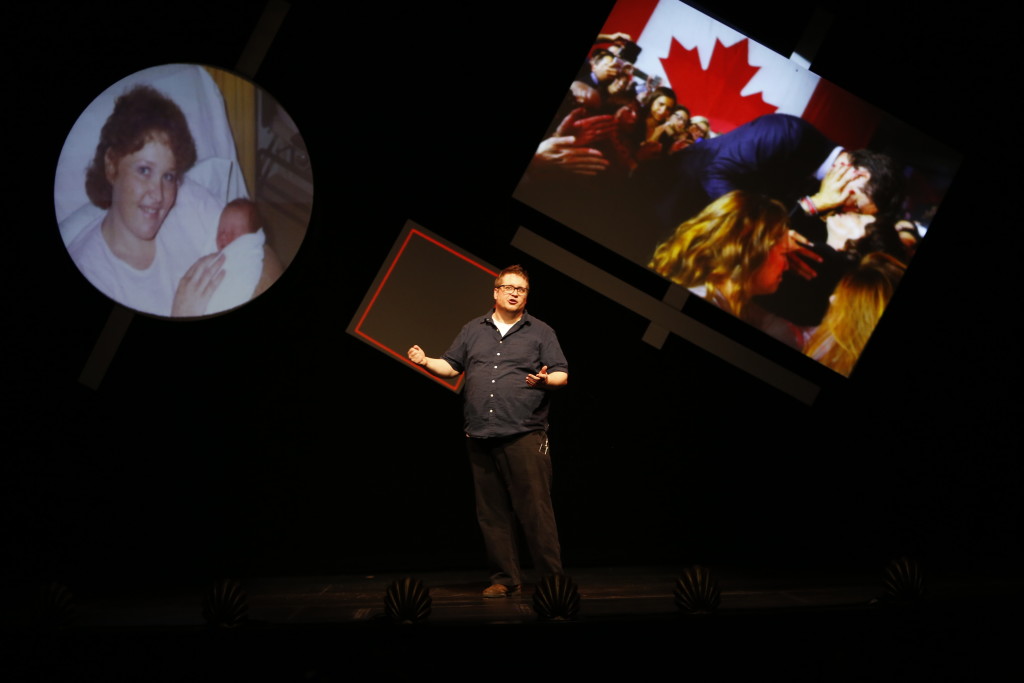Review by Sarah Higgins
Leftovers
The Cultch
York Theatre
Charles Demers is, like all good humans (and diamonds), multifaceted: comedian, author, teacher, socialist, dad, storyteller. And now, theatre artist. With Marcus Youssef and Neworld Theatre, Demers created Leftovers, presented by the Cultch as part of the PuSH International Performing Arts Festival. Performed by Demers, it’s a one-man exploration into his own life that seamlessly speaks to the way the world works for the rest of us, politically, emotionally, intellectually. And like all the best stories, Leftovers, too, is multifaceted, taking the shape of a spectacle, a stand-up routine, a lecture, or a heart-to-heart, as needed. Of all the anecdotes, ideas, emotions and humour that Demers offers, what is constant is the love he’s invested in this story, and in telling it to you—which, after all, is all anyone can ask of a theatre artist.
Interestingly, throughout the show Demers spoke about how he was telling the story as he was telling it. He deconstructed stand-up comedy, and then cracked a joke. He spoke about the arc of theatre shows, as he was building one. This transparency really engaged the audience, as did the show’s collective agreement. In the first few moments, Demers set out with the audience an agreement of how he would tell the story and what we would expect it to say…which of course is not how it ended up happening. Because as much as we defined the story collectively, he was the one telling it. It was an interesting exploration into how politics affect stories, and into theatre itself (which is, after all, a collective art form). And the politics were a large part of this story. Along with the comedy, they formed a spine for Demers’ story—Justin Trudeau, Thatcher, Regan, and Harper all made appearances as Demers broke open the comedy and pathos of how politics intertwine with everyday life.
The theatrical elements of Demers’ story were very well done. In particular, Parjad Sharifi’s simple but direct set and lighting design lent a quiet theatricality to the piece. The tree set piece was evocative, hidden behind a scrim until it was called for, and then lit up, slowly and warmly. Being the only living thing onstage aside from Demers, it was a clear emotional touchstone for the piece, although more explanation around why it was a tree could have strengthened its impact for the audience. Sharifi’s lighting was an easy, effective indicator of what mode the story was in—faint house lights for stand-up/lecture, deep spotlights for theatre. Projections were the main form of setting the stage (literally and metaphorically), and effectively incorporated both images and words. Occasionally, the surfaces on which the projections were shown distorted the images, forcing you to look at them nearly sideways, which distracted from their impact. However, those moments when Demers turned to face the images, especially the photos of his family, as if to anchor himself in the story…those moments were extremely powerful in their simplicity. In their humanity.
Demers was a master of blending poignant heartfelt moments with a comedic performance. From the very first announcement about cellphones through to the final joke, he laid a backbone of hilarious, sharp comedy. Underneath all of that, directors Marcus Youssef and Chelsea Haberlin (associate) dug in to the humanity in Demers’ story and his performance. Much of this came as he told the story of his mother—her leukemia, her death when he was 10, her love for him. The choice to tell the most emotional moments of his mother’s story starkly, bare-boned, was heartbreaking and beautiful. Demers’ quiet, constant restlessness as he spoke about his mum, sitting on a hard chair in a harsh spotlight, was riveting. It added honesty and rawness to the story—even more than was already there. This space that Demers and Youssef allowed for silence, for unfinished sentences and unanswerable questions was what merged all of the facets of this performance into one gripping, satisfying story. It’s because they weren’t trying to make it perfect. They were just telling it.
In the end, Leftovers isn’t just one thing. Like Charlie. Like theatre. Like everything worth something, it is complex and layered. It involves anger and laughter, discomfort and love, questions and not always answers because it’s a good story, told very well. And what else can you ask of a story, than to be told well and with love? Not much, really. Not much at all.
Leftovers is running at the York Theatre through January 30.
Sarah Higgins is into her second year of her Creative Writing Masters of Fine Arts at UBC. She’s foremost a playwright, and has had work produced at both edges of the country—from Little Mountain Lion Productions in Vancouver to a recent show in the Halifax Fringe festival.
